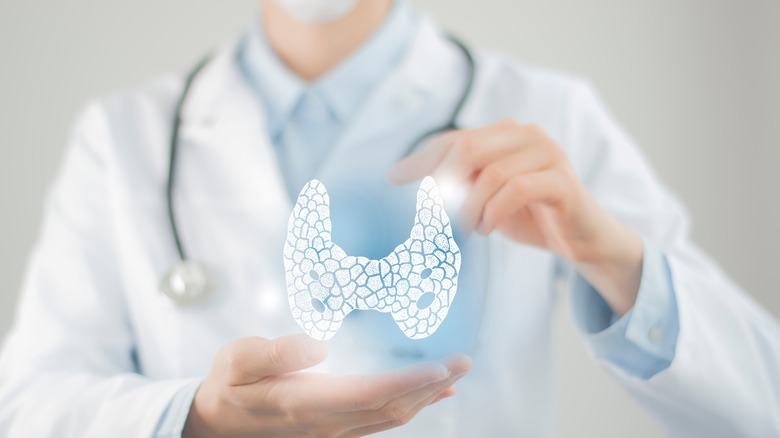What's The Difference Between Thyroid Markers?
According to the National Health Service (NHS), your thyroid is a butterfly-shaped gland in front of your neck in your trachea. A 2010 study published in the journal Informed Health explains that the thyroid gland plays a vital role in your body's metabolism and overall performance. The gland itself is part of the endocrine system and produces two main hormones: thyroxine or tetraiodothyronine (T4) and triiodothyronine (T3), per WebMD. The source notes that these hormones can affect everything from how fast your heart beats to whether you'll have a good night's sleep. When a disorder with the thyroid gland arises, the gland will produce too little or too many hormones, per WebMD.
If you think you may have a thyroid disorder, you'll need to take a blood test that measures your thyroid's T3 and T4 hormone levels, per the National Institute of Diabetes and Digestive and Kidney Diseases (NIDDK). The tests can give you a snapshot of your thyroid health and may include thyroid-stimulating hormone (TSH) and thyroid antibody tests, as stated by the NIDDK. Your doctor might favor a specific test over others.
What's the difference between TSH, T3, and T4 tests?
The Cleveland Clinic notes that TSH is a pituitary hormone that triggers the thyroid to produce thyroxine (T4) and triiodothyronine (T3). The TSH test checks whether your TSH level is high, low, or normal. Your TSH should be normal, ranging from 0.5 to 5.0 mIU/L, indicating that your thyroid is in optimal condition and your body produces enough thyroid hormones to support your organs (via UCLA Health).
While a TSH test is a standard initial test for hypothyroidism or optimal thyroid health, the Harvard Medical School says a simple TSH test doesn't tell the whole story. Your doctor might also request a T4 test or T3 when your TSH test shows abnormal results. T3 tests measure the thyroid gland's triiodothyronine (the T3 hormone), which is a more helpful indicator of hyperthyroidism, per MedlinePlus.
Regarding the T4 hormones, they exist in two forms: free and total, and there's a test for each, per Healthline. The free form is often preferred over the total because it directly measures the amount of free T4 in your blood, which is most available in the body, making it a more preferred test.
According to the NHS, a low level of TSH found alongside high T4/and or T3 levels could indicate hyperthyroidism (an overactive thyroid gland). In contrast, high TSH alongside low T4/T3 levels might indicate an underactive thyroid gland, also known as hypothyroidism (via UCLA Health).
Symptoms of hypothyroidism and hyperthyroidism
A 2019 study published in the journal Advances in Therapy estimates that about 5% of the U.S. population lives with hypothyroidism, with an additional 5% not knowing that they have it. The source claims that people with hypothyroidism can have various symptoms, including weight changes, fatigue, infertility, and heart disease.
As for hyperthyroidism, the National Institute of Diabetes and Digestive and Kidney Diseases says symptoms include muscle weakness, frequent bowel movements, insomnia, goiter, and menstrual cycle disruption. The institute adds that about one out of every 100 Americans above age 12 has hyperthyroidism, and it's common among women and seniors. Apart from these two major thyroid conditions, Healthline lists Graves' disease, Hashimoto's thyroiditis, and thyroid nodules as other thyroid conditions worthy of note.
Graves' disease is an autoimmune disorder that causes your immune system to attack your thyroid gland, leading to various hyperthyroidism symptoms. The U.S. Department of Health and Human Services says the disease is hereditary, and even though people of all ages are susceptible, women are more at risk. The same applies to Hashimoto's thyroiditis, which is also common in middle-aged women (via Mayo Clinic).
According to Johns Hopkins Medicine, thyroid nodules are also common and rarely show any symptoms. While many think all of these growths are cancerous, the organization emphasizes that some thyroid nodules are noncancerous.



